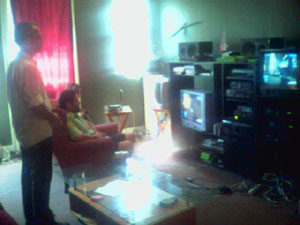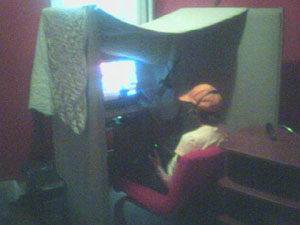Yesterday Bob did a radio interview on “The Speakeasy” on WFMU, almost certainly the most interesting (and one of the few) independent radio stations in the New York area. I highly recommend giving it a listen. It’s always nice to hear Bob tell the story of the Institute and the decades of work, collaboration and experience that led up to where we are today. Things tend to get caught up in the rhythm of the day to day on the blog so here’s a nice antidote — a big picture moment.
You can get the podcast from the Speakeasy archive in either RealAudio or m3u format (which will play on iTunes or whatever your default media player is on your machine). Heads up: there are a few minutes of jazz music before the interview gets started. The whole thing’s about an hour.
Category Archives: interview
mckenzie wark interview in halo
This interview with McKenzie Wark was conducted inside an online version of the Halo 2 video game as part of the upcoming fourth episode of This Spartan Life, “a talk show in gamespace.” Many thanks to Chris Burke and the TSL team for doing such a fantastic job. Click the image to play (it’s a little under 14 minutes):
From the interview, here’s McKenzie on collaborating with readers inside his book:
“It sort of brings out what writing always is anyway, which is that, in a sense, you’re always the DJ of other people’s thoughts and ideas, and this just makes that manifest.”
Also see this interesting thread in the GAM3R 7H30RY forum from a while back — a discussion between McKenzie and Chris about “glitching” and other forms of trifling or hacking within the game (the bread and butter of machinima filmmakers), and whether this can lead to real freedom. There’s a moment later on in the video where the debate gets wonderfully concretized in the physical landscape of the game world.
We “shot” the footage back in August at Chris’s studio in Brooklyn. I managed to snap a couple of hazy pictures with my camera phone:


On the left you see the room where Chris and the two camera operators have their consoles. On the right is McKenzie in his own little cave. Everything is recorded through video feeds running out of the Xboxes. Ken and Chris talk over headsets and move around the game environment while the two “cameras” follow behind (the cameras are just the perspectives of the other two gamers). The chaos during Ken’s reading at the end is the work of other online gamers from around the country — TSL groupies who like helping out with shoots and generally raising hell. Seeing Chris try to coordinate this rambunctious crew long distance was highly entertaining.
(If you haven’t seen it, also check out This Spartan Life’s interview with Bob from their first episode. A real treat.)
an interview with bruno pellegrini
Last week I posted about Le mie elezioni, a film about the recent Italian elections constructed from footage shot by the general public, mostly part of Italy’s videoblogging community. Le mie elezioni will be released on the 15th of May: according to an article in Il manifesto more than 150 videobloggers have submitted more than 50 hours of materials which are being furiously edited right now. You can watch a rough cut of the trailer here.
 The footage is being put together into an hour-long film by the website Nessuno.TV a portal for Italian videobloggers, which is run by Bruno Pellegrini, who also teaches the sociology of communications at the Universitá di Architettura in Rome. I sent him an email asking about the project; while Bruno happened to be in the U.S. last week, but his (and our) travel schedule didn’t allow him to stop by the Institute. Nonetheless, we conducted an interview, via email. My questions are in bold; his responses are indented.
The footage is being put together into an hour-long film by the website Nessuno.TV a portal for Italian videobloggers, which is run by Bruno Pellegrini, who also teaches the sociology of communications at the Universitá di Architettura in Rome. I sent him an email asking about the project; while Bruno happened to be in the U.S. last week, but his (and our) travel schedule didn’t allow him to stop by the Institute. Nonetheless, we conducted an interview, via email. My questions are in bold; his responses are indented.
Can you describe how the project came about?
It was born in a very natural way, as some of the vloggers who already participated at BlogTV (the first ever TV station broadcasting user-generated content) suggested covering the election together. Then the idea of the movie came up.
Is this project part of a larger Italian web response to media consolidation? How widely do people share your belief that the perception that big media has failed to cover things it should be covering?
I do not think this project is specific to Italy. Although the situation in my country is embarrassing I believe it is only a little ahead compared to what is going on abroad. Big media has failed (sometimes deliberately) to cover things all over the world for the last decades and the web has given people a chance to re-balance the power. Whereever and whenever there are major needs for a democracy, you can be sure something is going to happen . . . With regards to people, only a small part is conscious about what is going on, and the others are not helped by mass information . . . In general there is a common sense of distrust of politics, media and power.
In the U.S., the 2004 elections brought out – for the first time – a huge number of political bloggers; this seemed to be the first time that the blogosphere registered in the mainstream media, and there’s the perception that the U.S. blogosphere exploded at that point. Have these elections done the same thing in Italy? Or did people turn to the Internet earlier?
Not at all, unfortunately. The Italian blogosphere is not as mature as it is in the U.S. We still lack a common identity and, most of all, consciousness of the power of being media . . . Hopefully this will happen in the next political campaign, and I suspect it will come out not from the classic political separation (left and right) but from an increasing fight between young and old people with the latter trying to keep their undeserved priviledges . . .
How big is the videoblogging community in Italy? We periodically look in on it in the U.S., and while everyone loves Rocketboom, it doesn’t really seem to have taken off here as much as everyone expected (although maybe things like YouTube and Google Video are changing that). Did you find people getting interested in videoblogging because of the project, or was there already a vibrant community?
Vibrant is not exactly the right word, maybe promising would be more appropriate. I think it is a matter of critical mass and once reached it will grow exponentially like all the network related trends.
The question of copyright. Watching the clips, I couldn’t help but notice the music – songs by the Arctic Monkeys & Caparezza playing in the background, as well as video clips from the news and I think a couple of press photographs. In the U.S. documentary film makers increasingly have problems with clearance issues – the owners of the songs charge thousands of dollars for the rights to use even a few seconds of them. We’ve been covering this issue of fair use rather closely because it seems to figure in many of the things you can do with multimedia. I’m curious how much of a problem it is in Italy – is this something you worry about there?
So far it is not a problem at all and we can deal with the fair use regulation. I believe the majors will play harder in the future, especially with music and movies, but there are already good open access libraries and the Creative Commons movement is getting stronger in Italy too.
Many thanks to Bruno Pellegrini for being so generous with his time. If people have more questions about this project, don’t hesitate to leave them in the comments section.

